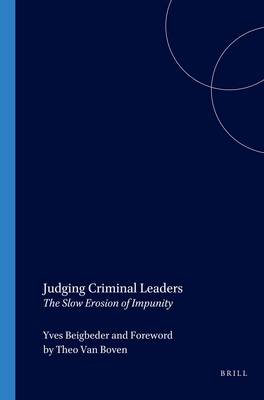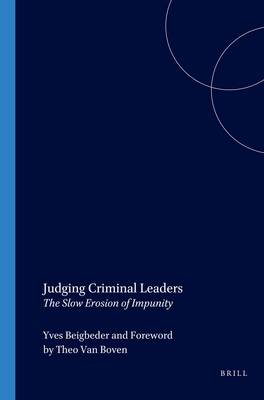
Bedankt voor het vertrouwen het afgelopen jaar! Om jou te bedanken bieden we GRATIS verzending (in België) aan op alles gedurende de hele maand januari.
- Afhalen na 1 uur in een winkel met voorraad
- In januari gratis thuislevering in België
- Ruim aanbod met 7 miljoen producten
Bedankt voor het vertrouwen het afgelopen jaar! Om jou te bedanken bieden we GRATIS verzending (in België) aan op alles gedurende de hele maand januari.
- Afhalen na 1 uur in een winkel met voorraad
- In januari gratis thuislevering in België
- Ruim aanbod met 7 miljoen producten
Zoeken
€ 255,45
+ 510 punten
Omschrijving
In spite of the Geneva and The Hague Conventions of the late 19th century, the Twentieth Century has been a century of massacres and genocides: the massacres due to European colonialism, two World Wars, the Holocaust, the Armenian and the Rwanda genocides, the casualties caused by the Communist utopia in the USSR, China and Cambodia, and numerous civil wars.
Most of the leaders mainly responsible for these massacres and genocides have enjoyed impunity. However, there is a slow popular awakening to the fact that leaders should be accountable for their crimes. A human rights regime was created after World War II, international criminal law has taken root with the Nuremberg and Tokyo Tribunals, and, in the 1990's with the International Criminal Tribunals for the Former Yugoslavia and for Rwanda. In 1998, the Statute for an International Criminal Court was adopted, while the arrest of former dictator Pinochet in London has created both a political storm and a judiciary advance. The "Princeton Principles on Universal Jurisdiction" have been publicized in an effort to strengthen the application of international law in national legal systems. In Cambodia and Sierra Leone, mixed national/international courts are being set up to try criminal leaders.
This unique volume offers the reader an overview of the various models which are emerging to ensure that criminal leaders and their collaborators are made accountable for their schemes and actions, and clearly illustrates how national, international and mixed national/international tribunals are slowly eroding the impunity of criminal leaders.
Most of the leaders mainly responsible for these massacres and genocides have enjoyed impunity. However, there is a slow popular awakening to the fact that leaders should be accountable for their crimes. A human rights regime was created after World War II, international criminal law has taken root with the Nuremberg and Tokyo Tribunals, and, in the 1990's with the International Criminal Tribunals for the Former Yugoslavia and for Rwanda. In 1998, the Statute for an International Criminal Court was adopted, while the arrest of former dictator Pinochet in London has created both a political storm and a judiciary advance. The "Princeton Principles on Universal Jurisdiction" have been publicized in an effort to strengthen the application of international law in national legal systems. In Cambodia and Sierra Leone, mixed national/international courts are being set up to try criminal leaders.
This unique volume offers the reader an overview of the various models which are emerging to ensure that criminal leaders and their collaborators are made accountable for their schemes and actions, and clearly illustrates how national, international and mixed national/international tribunals are slowly eroding the impunity of criminal leaders.
Specificaties
Betrokkenen
- Auteur(s):
- Uitgeverij:
Inhoud
- Aantal bladzijden:
- 230
- Taal:
- Engels
- Reeks:
- Reeksnummer:
- nr. 55
Eigenschappen
- Productcode (EAN):
- 9789041118158
- Verschijningsdatum:
- 1/06/2002
- Uitvoering:
- Paperback
- Formaat:
- Trade paperback (VS)
- Afmetingen:
- 237 mm x 163 mm
- Gewicht:
- 358 g

Alleen bij Standaard Boekhandel
+ 510 punten op je klantenkaart van Standaard Boekhandel
Beoordelingen
We publiceren alleen reviews die voldoen aan de voorwaarden voor reviews. Bekijk onze voorwaarden voor reviews.









